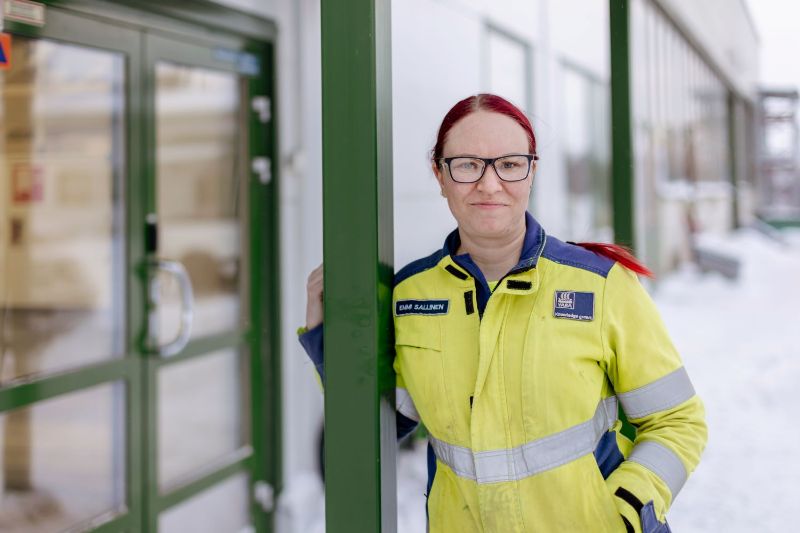Process operator
"The work of a process operator is interesting and varied. There are various kinds of factories and plants where the job can be done. The job title can be used to apply for a range of different jobs, for example in a mine or a dairy factory."

- Emmi Sallinen
- A process operator at Yara Suomi Oy.
- Completed a basic qualification in process operating at Savo Vocational College.
- Five years of work experience in the field.
Briefly explain what you do for a living.
I work at the Siilinjärvi phosphate mine as a process operator. My job is to supervise the operation of the processes at the enrichment plant and paste plant, in other words the tailings processing plant. There are many process operators at the plant, but everyone's job varies according to their shift. Process operators working shifts act as operators, that is to say they drive the machines in the factory and keep them running.
I work the day shift. I carry out minor maintenance and repair work, cleaning and various general tasks at the factory. I'm also responsible for tasks that are not the responsibility of an operator or maintenance technician. Sometimes I fill in for shift operators. That's when I control the machines in the factory and check on the monitors to make sure everything is working as it should be.
How have you ended up in the profession of your choice?
I used to work as a cleaner at this mine. A colleague of mine went to study to become a process operator and I decided to follow their example. After graduating, I applied for a job as a process operator in the same mine. I applied to work here because, as a cleaner, I had seen what kind of place the mine is and what kind of work is possible here. Without my previous work experience at Yara, I probably would not have considered the mine as a potential workplace.
Describe your typical working day or week.
In the morning, I attend the meeting where the day's work is shared out, then I go with a partner to complete the tasks planned for us. My partners vary on different days. I have certain tasks that I do every week on a set day and time, for example adding grinding balls and steel bars to the rock grinding mills in the enrichment plant. Other work may change during the day depending on changes or disruptions at the factory.
What kind of work environment or working hours do you have?
I can't say that I do neat interior work. The working environment is a factory where stone is crushed and there's a lot of noise and dust. Because of that, I wear hearing protection, a dust mask and other protective equipment. I work alternately indoors and outdoors, in the enrichment plant and at the mine ‘s paste plant, in other words the tailings processing plant.
I mostly work day shifts from 6 a.m. to 2 p.m. I sometimes work evening- or weekend shifts when I cover for shift workers.
What kind of competence or qualities are required in the profession?
Sometimes the job involves physically demanding tasks, so a process operator needs to be in good physical condition. You also need to be able to solve problems and react quickly if, for example, a machine malfunctions.
What is the best thing about your profession?
I like the fact that the tasks change and the work is varied. At the end of the day, I can leave my work here and not have to do think about it at home. No two days are ever the same.
What are the downsides of the profession or what seems challenging?
For me, irregular working hours and shift work are the hardest parts of this profession. Evening- and weekend shifts and filling in for other people can sometimes lead to long periods of work, which can be exhausting.
What would you tell a person considering the profession of a process operator?
The work of a process operator is interesting and varied. There are various kinds of factories and plants where the job can be done. The job title can be used to apply for a range of different jobs, for example in a mine or a dairy factory.
How do you see the future of your profession?
I believe that there will continue to be plenty of jobs for process operators in the future, in a variety of factories and production plants. Robots and automation will not replace this work, at least not in this workplace.
Photo: Ilona Savitie
